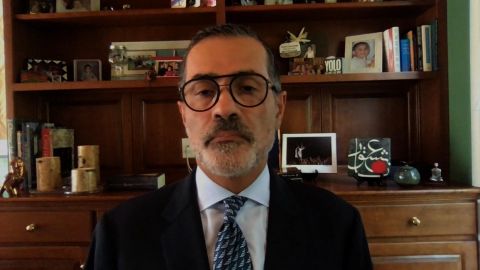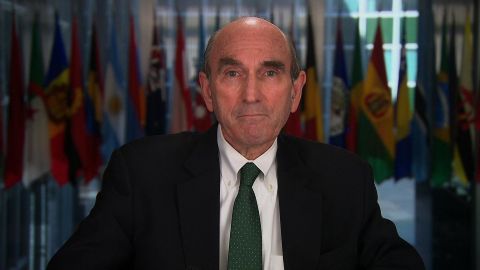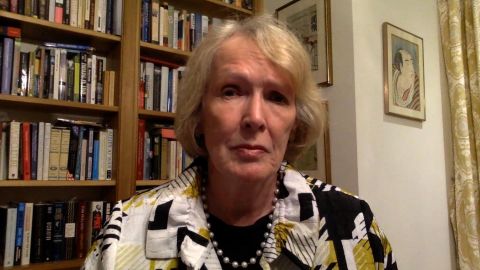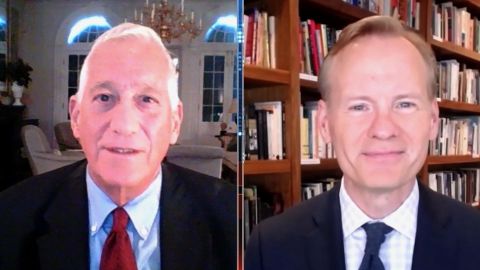Read Transcript EXPAND
CHRISTIANE AMANPOUR: Professor Margaret MacMillan, thank you so much for joining us. And our next guest says that we look to the president for far too much. John Dickerson is a correspondent with CBS’ “60 Minutes” and a seasoned political journalist. His latest work hit “The New York Times” bestseller list. It is called “The Hardest Job in the World: The American Presidency.” In it, he reminds us how much the office has been expanded, especially since the 1950s, and why that makes it such an onerous role. Here he is talking to our Walter Isaacson about it.
WALTER ISAACSON: Thank you, Christiane. And, John Dickerson, welcome to the show.
JOHN DICKERSON, AUTHOR, “THE HARDEST JOB IN THE WORLD: THE AMERICAN PRESIDENCY”: Thank you, Walter Isaacson. Great to be with you.
ISAACSON: And your book, “The Hardest Job in the World,” it’s sure become prescient now. When we look at what’s happening this week with Trump’s health, let me ask a basic question, which is, what do we have the right to know about a president health, and why do we have the right to know it?
DICKERSON: Well, the president does have a privacy screen, but it’s a pretty small screen. And that gets pushed to the side when his private health starts to conflict with his public role. And something — as you know, the president’s a lot of times don’t want these public details out about their health. This one in particular, the reporting tells us, has been very reluctant to have things out in public, including the fact that he needed oxygen. But the problem is that they have a — that his staff and the president have a stewardship duty to the job and a national security role, which is both in decision-making, but then also in the public posture of the presidency. And those obligations are bigger than the private security or the privacy interests of the individual president. And also, I should say, finally, since his health connects with this larger story of COVID-19, how his health is handled actually sends a message and connects with greater public confidence about the federal government’s ability to handle the pandemic that still rages.
ISAACSON: Explain that a bit more. The secrecy about his health, and the way that they approach the COVID crisis, how do those intersect?
DICKERSON: Well, if you look at the major criticisms of the administration, it has been that they have downplayed the risk, that they did not take sufficient effort to fight the pandemic, and then, once they had — were pressed with the issue that they repeatedly misinformed the public. Those are the three public criticisms of the overall pandemic. Well, they have now replicated, in miniature, as if by plan, all of those mistakes with respect to the president’s specific health, and here, with 30-some-odd days until the election, very bad timing. But the way in which now the president, who is at the focus of every news story right now, is repeating the mistakes of the larger administration, and there is still a pandemic raging, and people need clean public information about the nature of the pandemic, not just the president’s health. Why? Because that’s the precondition for people being able to inch their way back into public life, which is the precondition for getting the economy going again. And this debate over masks, which the president has been a participant in, is really — when you talk to economists, they say we have to stick to masks because that’s the only way people will feel less risky about engaging in public life again, which is the way you get the economy going again, not to its previous place where it was before the pandemic, but people have to be able to get back out again. They can’t do that if they’re fearful about the way this pandemic is unfolding.
ISAACSON: We’re about to go into a vice presidential debate. And we have two people at the top of the ticket who are in their 70s. Does this change the nature of what we’re looking for in a vice president?
DICKERSON: And that debate, when it takes place, they will be five feet further apart, so in — to accommodate the new reality of a White House where the — which seems to have been host to a super-spreader event. And so it’s just another way in which this is constantly in the forefront or even in the background. Vice presidential debates, they always have to kind of dance around the idea, well, you might be in the top job to — and, as you remember, that’s what got Dan Quayle in trouble, when he compared himself to John Kennedy, because he was trying to say, I have as much experience as Kennedy does. Well, now that question is right on the nose, I mean, maybe a little too on the nose for the moment we’re in. But also — so, they will obviously talk about that. And it is important, as you say, not just because of the president’s health at the moment, but because of the age of the president. And so it adds a little more weight to the event, but also because the role of the vice president has changed. Dick Cheney was quite involved. Joe Biden was very involved in the Obama administration. And Mike Pence is the head of the task force combating coronavirus. So he’s got a lot to answer for, sort of separate from his — from what he may do in the future if there’s a second Trump term.
ISAACSON: Do they have a plan for how to deal with crises doing this current moment, where the president is somewhat out of the main action?
DICKERSON: Well, they have — in some sense, they have a plan, in the sense that the 25th Amendment is there for replacing a president. And then there are also patterns for the way the 25th Amendment has been used in kind of short-term periods. We had Ronald Reagan use the 25th Amendment, although he did a funny little legal thing to keep from actually using it — but when he went in for his colonoscopy. George W. Bush did that twice when he went under for a colonoscopy. Dick Cheney was briefly in charge. So, that pattern and operations manual is pretty well in place. Of course, if the president refused to give up power for a temporary period of time, then you would start to get into the really exciting parts of the 25th Amendment, where the majority of Cabinet has to vote and so forth. But what they lack a plan for, it seems, from the way they have handled this so far, is just the operational tempo that’s required to handle surprises. And, again, that’s the way in which the administration has echoed in this moment the larger challenge they have had handling the surprise of COVID-19. And that starts long before COVID-19 was even in the conversation. It starts, based, again, on all of my reporting, from having an operating team where people understand how the others operate. They might — there will be tensions, as there is any high-functioning team, but if you put a premium on having a good team without a lot of turnover — and the president has had serial turnover in his top spots — then people get used to working with each other. They can move without having to have a conversation, because they have patterns of thinking and understand how to manage things, even if they don’t know what the specific crisis is going to be. We have seen in the handling of the president’s own personal health, everything from Chris Christie, who was a participant in the debate prep, not knowing that he was exposed until he read about it in the newspaper, then the conflicting reports about the president’s health, all of those things suggest what we have seen in the administration, which is basically a team that doesn’t work that well together in tackling the to do list of any particular surprise.
ISAACSON: In your book you write about Eisenhower’s heart attack. Tell us what the relevance of that today.
DICKERSON: James deacon wrote a book about the modern American relationship with press relationship with the, the presidency. And he starts with Eisenhower’s heart attack as a moment where the press changed its relationship to the presidency, because they basically lied to the press about what had happened to Eisenhower. They said, he’d had too many onions on his burger while he was playing golf. Now he was a hothead and had a big temper, but it was not the burger in his temper that had caused him to be out of commission. And that lie about the heart attack and the, and the importance of that. I mean, um, because of the national security cold war environment was a moment where the press started to, you mentioned the credibility gap started to think about that, started to think about the information they were getting from the white house, and it wasn’t, um, and it had, again, this important national public service interest, which was that you needed to make sure the president was okay to make the kinds of weighty decisions you had to during the cold war. So Eisenhower’s heart attack and the handling of it made started to make the press more skeptical, particularly on the health issues. Um, and, uh, but having said that, um, of course John Kennedy, uh, basically lied about his Addison’s disease straight up during the campaign and then throughout his presidency. Um, so as skeptical as the press may have been, uh, they weren’t so skeptical that they, they burst through that, that curtain of lies with, with John Kennedy. Um, but that was before Eisenhower, of course, you know, Cleveland got him, his jaw reconstructed when he was sick. Wilson was basically, uh, an invalid for the end of his presidency. Um, so there had been even greater shielding of the press from, from the truth about the president and, uh, and after Ike, that started to disappear, um, and we’re even watching the president is limited as the information has been with Donald Trump. Um, it’s far more than we would have had in previous generations.
ISAACSON: In your great book, you called the presidency, the hardest job in the world, because there are all sorts of what we call black Swan events or unexpected things happening. And we judge our presidents, uh, on what they do on things that just hit them, even if it wasn’t exactly their fault, like hurricanes. You have a wonderful scene of Lyndon Johnson coming right down here in New Orleans, right down the street from me, uh, because Russell Long pushed him to do so. And you contrast that with Trump throwing paper towels to the people in Puerto Rico, and then to George W. Bush getting it wrong at first, and then finally getting it right on how to handle a hurricane. How do you see Trump’s ability to deal with those type of crises?
DICKERSON: Well, you know, Michael Bloomberg said, when he was asked as mayor what he did his first hundred days, he said, I built a team and he said, nobody in the press understood what he was talking about, but what he meant was I figured out who we’re going to be the best people in the best possible positions, because the job even at being mayor of New York was too big. And so you had to think about it in it as an organization, not just an individuals, um, an individual’s responsibility, president Trump never thought of it that way. Um, he refused to talk about the transition while it was going on. And when his transition team gave him a plan for how to set up his administration, the administration was a, the transition team is run by Chris Christie. Christie was fired. His work was thrown out. So from the start that, um, foundation and administration needs to be able to handle the kinds of crises you’re talking about was never put in place. So that’s the big first problem. The second is that the president is highly improvisational, which is fine if you’re a single actor, but, um, you know, if you go back and talk to any of the chiefs of staff, because an organization is so large in the presidency, the individual improvisation of any one of its members, particularly the person at the top throws the, of the system out of kilter. So the ability to respond is very difficult when you’ve got all kinds of when you’re having to respond to the crisis and respond to the improvisations in the moment. And so that makes it very hard to respond to these kinds of crises. On Puerto Rico and the president’s disaster response more broadly, it requires a sense of empathy and a view that the job is that it is knit into the job that you were supposed to not only be empathetic towards other Americans, but that you must show it publicly because it sends a message to the public that it’s government, that it pays all these taxes to is on the case. And the president doesn’t feel that obligation. Um, and so when he went to Puerto Rico, he was talking more about the spinning, the numbers of the dead, throwing the paper towels, just not feeling as though he was obligated to play that public role that as you said, Lyndon Johnson really was one of the, the entrepreneurs in recognizing the connection between caring for the public and how that could benefit you publicly or politically as a president.
ISAACSON: One of the roles you talk about in the book as well, that a president must play is that of unifier. Why does Trump act the way he does if that’s supposed to be the role of the president?
DICKERSON: Well, he may have, and his certainly his voters, uh, believe that he has a central insight, which is all of these, this talk of bipartisanship and all of these Washington, the coziness has hurt his voters. Secondly, it doesn’t get anything done that if he wants to get something done, he can either waste a lot of time pretending to try to get bipartisan solutions that he’s never going to get because of the structure of Washington, which is to say that the presidency that he walked into was one in which he had, uh, angered a lot of Democrats during the campaign. He made a calculation, both because it’s temperamentally the way he, his instincts tell him, but also no Democrat was going to work with him because they would pay such a political price for doing so. So if that’s the reality, why, why waste a lot of time on bi-partisan efforts? Just try to get everything you can through the structure in the way it exists in the moment. That essentially is the position that Barack Obama, after failing several times to try to do things through a bipartisan process, came to at the end of his presidency. And he basically said, you know, these Republican senators that you think I might be able to convince their voters are never going to let them work with me. In fact, Pat Toomey, the Senator from Pennsylvania said on gun control legislation, don’t talk about it because if you, mr. President talk about it, it then becomes associated with you and my Republican colleagues can’t vote for it. They told them the same thing on immigration. If you, mr. President are associated with this bill, it becomes a Barack Obama’s bill. Republicans will be tarred if they vote for it. So lay off, um, in that environment, president Trump has made the case, like why bother with trying to work for bipartisan solutions? The problem of course, is that that that makes the BA the partisanship even worse. And you have this tit for tat and you see it most with respect to the Supreme court nominations, those issues where people are at their fire, easiest and hottest, emotionally.
ISAACSON: Donald Trump, when asked about things like the total fiasco of testing and America, or some of the problems that we’ve had, uh, stopping the spread of COVID said, it’s not my fault. I’m not at all responsible for this in your book. You talk, even describe how Truman got the buck stops here, sign put on his desk, uh, to what extent should the president abide by that policy of the buck stops here?
DICKERSON: You know, I went into the book thinking maybe we’re a little bit too sloppy in saying the buck stops here for the presidency, because what it came to mean in, in Truman’s case, of course it meant I have to make the decisions. Nobody else can make these decisions I have to. And so, um, all you Monday morning quarterback, so we’re looking at me, you know, you see, you think about how you would have made that decision yet under the circumstances I had to make it because there’s no passing the buck. It’s coming to me now, essentially the president sort of blamed for anything that happens during, from inauguration day until they leave the office. And I thought that was maybe a little unfair. Barack Obama was blamed for the BP oil spill. He had nothing to do with it. And the federal government doesn’t have a particular skill in capping belching oil Wells, however, after doing some reporting, but looking both at Eisenhower, who said, basically you have to take responsibility because of the effect it has on your team. When I looked at Bloomberg, says a version of the same thing sometime, and Tim cook talks about his job is as taking the noise away from his colleagues. And then I talked to him, Mitt Romney, who’s done a lot of leading in his life in lots of different kinds of organizations. And he basically said, yeah, the job is basically you get blamed for everything, but that means also you can take credit for everything. Why is this important? Well, politically it tells all of your advisors immediately, I’m taking the blame for this and therefore don’t spin this problem, solve it because we can’t get around. And COVID-19, it’s a perfect example. You can’t talk your way out of COVID-19 you have to solve it. You have to come up with a solution to it. And that very bulky, a blunt kind of, uh, accountability for a president as, as blunt as it is. And maybe it’s unfair. In some cases it does move the bureaucracy into action in a way that based on my interviews is effective. And so I kind of changed my mind on that in the course of doing the reporting.
ISAACSON: Ever since you wrote whistle stop what we’re best at time magazine. And now with this great history book, you’ve loved the flow of history throughout American history. This is not the worst period of America has gone through. I mean, it’s certainly not the civil war, maybe even the 1960s, but is this past few months, the weirdest time you’ve ever read a witness?
DICKERSON: Well, if I got that passion, you’re in part too, you’re in part to blame for it, uh, as starting me out on in life so many years ago at time. But it is, I mean, you’re weird as a really good example. I mean, people have made jokes about the fact that the script writer for 2020, um, you know, has, has lost their creative flair. And they’re just doing things that are just so outrageous. And yet, of course, this is the reality that we live in. I mean, part of it, of course, is that everything’s so quick. And, um, we have, um, the, the sense of the Gallup of events, which means that there’s no time to kind of settle and maybe find some stability. So there’s a constant sense of jitteriness, but the events themselves are pretty jittery, but as you quite rightly point out, um, you know, there aren’t tanks in the street, as there were in, in 1968, you don’t have, uh, the assassinations. I mean, when you spend time in 1968, you just wonder if by today’s hyperventilating hummingbird responses to things. If we reacted that way in 1968, I mean, you would, you, I don’t know that the country could have handled it. Um, there was a kind of stability that it feels like in reading about with respect to those events that we don’t have today. It’s a con the hyperventilation in the moment really makes this feel, um, um, very different. And, but also as you point out, it’s very weird. It’s very weird to see a president in a, in a vicend, waving at his supporters at Walter Reed. That’s, there’s no analog in that, in presidential history for that, that can help, help give us a little stability, which is what history usually does.
ISAACSON: John Dickerson as always thank you for being with us.
DICKERSON: It’s great to be with you, Walter. Thanks, Walter.
About This Episode EXPAND
Christiane speaks with Elliott Abrams and Vali Nasr about national security. She also speaks with historian Margaret MacMillan about what this moment will mean in the future. Walter Isaacson speaks with John Dickerson about whether or not we expect too much of U.S. presidents.
LEARN MORE



